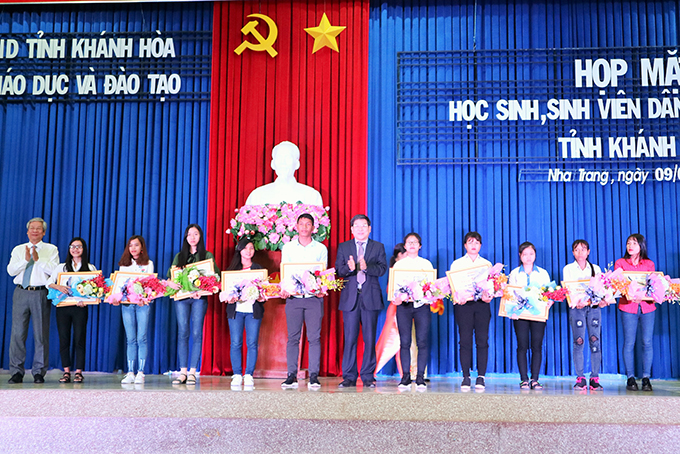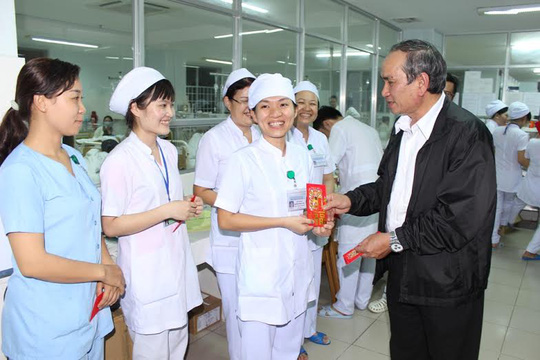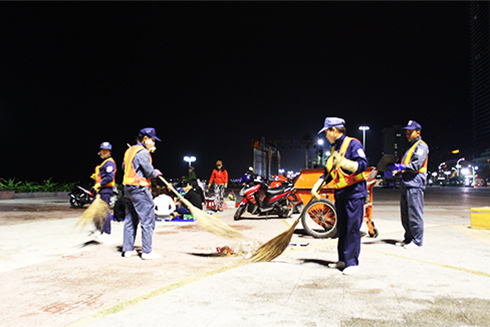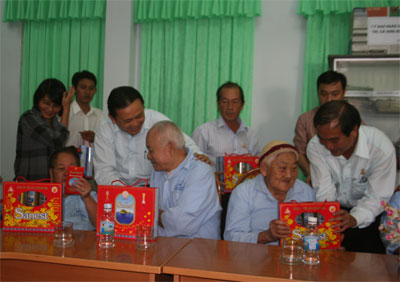
Khanh Hoa Provincial Department of Education & Training has held a New Year meeting for ethnic minority students. Over the past years, ethnic minority students have much benefited from the Government's preferential polices...
Khanh Hoa Provincial Department of Education & Training has held a New Year meeting for ethnic minority students. Over the past years, ethnic minority students have much benefited from the Government’s preferential polices. Ethnic minority pupils and students from poor households get a monthly grant worth 60% of basic salary per month for study expenses; and a boarding grant equivalent to 100% of basic salary per month. Besides, extra preferential support provided by Khanh Hoa Province include scholarships and grants for ethnic minority students and nursery children; lunch support, 30% of schools fees for those in disadvantaged communities and 30% of schools fees for those in Khanh Son and Khanh Vinh. The practical polices have assisted students with their academic pursuits, contributing to the educational development in mountainous areas.
In 2017, the total expenditure for preferential policies for ethnic minority students was more than VND1.9 billion, including VND1.4 billion grants for ethnic minority students pursuant to Khanh Hoa People’s Council Decree No. 02/2015 and nearly VND500 million scholarships and financial support for daily expenses and tuition.
There are 409 ethnic minority students, including 89 freshers at 38 universities, colleges and vocational high schools nationwide in the 2017-2018 school year, up 17 students compared with the last school year. The ethnic minority students include 110 at university, accounting for 26.9%, up 2.9%, 116 at college, making up 28.4%, down 26.2% and 183 students, accounting for 44.7%, up 23.3% at vocational high school.
112 students are major in pedagogy, accounting for 27.4%, down by 1.8%; 40 students in medicine & pharmacy, making up 9.8%, down by 1.5%; 187 students major in engineering and vocational training, accounting for 45.7%, up 21.8%. Most of them are students at Khanh Hoa University, Nha Trang National College of Pedagogy, Hue University of Education, Quy Nhon University, Hue Medicine & Pharmacy University, Khanh Hoa Medical College and other vocational schools.

|
Le Tuan Tu, Director of Khanh Hoa Department of Education & Training says much concern and support have been given for ethnic minority students, contributing greatly to developing skilled labor for socio-economic growth in mountainous areas. Ethnic minority students have tried their best in study and achieved satisfactory results. In the 2016 – 2017 academic year, 118 students were graded good, accounting for 28.8%, including 5 graded very good and 113 graded good. However, 23 students (5.9%) were graded below average.
After graduating, many ethnic minority students have returned to work for their native villages. Dam Thi Diep, a Nung minority person residing in Khanh Vinh District has graduated from Nha Trang University, environmental engineering technology, in the course 2012-2016. She is working for Cam Lam District Party Committee. “I am from a poor family. My parents had to work hard to take care of me and pay for my tuitions. I realize that studying can change the life of my family. When I was a student, I received much support from local leaders. It has inspired me to greater efforts to overcome difficulties and get forward” she says.
At the meeting, Le Thanh Quang expressed his delight about the suitable career choice trend, meeting the requirement for local socio-economic development, especially in remote mountainous areas. He highly appreciated achievements made by ethnic minority students and encouraged them to make greater effort in study to be successful in life, improve their living standards and help their families out of poverty. He also requested local departments and agencies to continue providing consultancy for students to choose suitable training programs; and accommodate polices to best suit learning conditions of ethnic minority people.
H.Ngan
Translated by N.T









